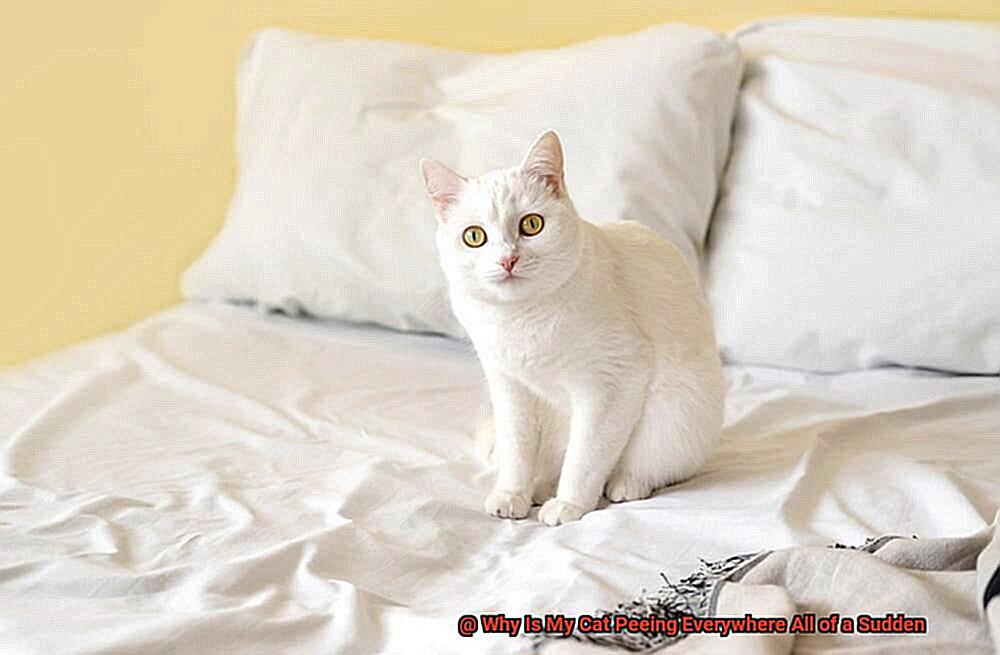Cats are undoubtedly one of the most beloved pets worldwide. They’re adorable, affectionate, and can provide endless hours of entertainment. However, as much as we adore them, they can sometimes display odd behavior that can leave us scratching our heads in confusion. One such behavior is when your cat suddenly starts urinating everywhere except their litter box.
As a cat owner, you may have experienced this issue before. You think everything is hunky-dory with your feline friend until you catch a whiff of an unpleasant odor emanating from a corner of your home. That’s when you realize that your once well-trained kitty has decided to use your expensive rug or couch cushion as their personal toilet.
But don’t despair just yet. Before you start considering giving up on your furry companion, it’s essential to understand why they’re behaving this way. There could be numerous reasons behind this sudden change in behavior ranging from behavioral issues to underlying health problems.
In this blog post, we’ll dive deep into some of the most common explanations for why your cat is peeing everywhere all of a sudden. So sit tight and read on because pretty soon, you’ll be able to identify the root cause of your cat’s inappropriate urination and take steps towards restoring peace and cleanliness in your home.
Causes of Cat Peeing Everywhere All of a Sudden
When they start peeing outside of their litter box all of a sudden, it can be worrying. But fear not, we’re here to help you understand the possible reasons behind your cat’s sudden change in behavior, and what you can do to help them.
One common cause of sudden cat peeing is urinary tract infections (UTIs). These infections can be very uncomfortable for your cat, causing them to avoid using their litter box altogether. If you notice other symptoms such as lethargy or loss of appetite, don’t hesitate to take your cat to the vet immediately.
Stress and anxiety are also common culprits for sudden cat peeing. Any changes in their environment, such as moving to a new home or the introduction of a new pet or family member, can trigger stress in cats. Creating a comfortable and stress-free environment for your cat can help alleviate these issues.
Medical conditions such as diabetes, kidney disease, or hyperthyroidism can also lead to increased urination in cats. If you suspect that your cat may be suffering from any of these conditions, it’s crucial to take them to the vet for proper diagnosis and treatment.

A dirty litter box is another reason why your cat may avoid using it. Cats are clean animals and prefer a clean litter box. Be sure to scoop the litter daily and change it once a week to encourage your kitty to use the litter box instead of other places in your home.
Lastly, territorial marking is another reason why cats may pee outside their litter box. This behavior is more common in unneutered male cats but can occur in females too. Neutering your cat can help prevent this behavior.
Sudden cat peeing outside the litter box is not normal behavior and could be a sign of an underlying issue. It’s essential to observe your cat’s behavior and take them to the vet if you notice any changes. With proper diagnosis and treatment, you can help your cat overcome any health or behavioral issues that may be causing them to pee everywhere.
Medical Issues That Can Cause Cat Peeing Outside the Litter Box
It’s essential to remember that this behavior may be a symptom of an underlying medical issue. In this article, we will explore three common medical problems that can cause cats to pee outside the litter box and what you can do about it.
The first medical issue that can cause your cat to avoid the litter box is a urinary tract infection (UTI). UTIs are caused by bacteria infecting the bladder, leading to inflammation and pain. Cats with UTIs may associate the litter box with discomfort and choose to go elsewhere. Other symptoms of UTIs include increased urination, straining to urinate, and blood in urine. If you suspect your cat has a UTI, take them to a veterinarian immediately for treatment.
The second medical problem that can cause your cat to pee outside the litter box is kidney disease. Kidney disease is a chronic condition that affects the kidneys’ ability to filter waste from the body, leading to an accumulation of toxins in the bloodstream. Cats with kidney disease may drink more water than usual and urinate more frequently, which can lead to accidents outside the litter box.
The third medical issue that can cause your cat to avoid using the litter box is bladder stones or crystals. These hard mineral deposits form in the bladder, causing irritation and pain. Cats with bladder stones may associate the litter box with discomfort and choose to go elsewhere. Other symptoms of bladder stones include straining to urinate, blood in urine, and frequent licking of genital area.
If you notice any of these symptoms in your cat, it’s crucial to take them to a veterinarian immediately. Early diagnosis and treatment can prevent complications and help your cat recover faster.
The veterinarian may prescribe medication or recommend changes to your cat’s diet or environment to address these medical issues.
Behavioral Issues That Can Cause Cat Peeing Outside the Litter Box
While medical issues may be the culprit, behavioral issues are often the reason behind this problem. Stress, fear, and territorial marking are some of the most common causes of cats urinating outside their litter box.
Cats are sensitive creatures that can become stressed and anxious from changes in their environment. Whether it’s a new pet, a new baby, or a move to a new home, these changes can trigger your cat’s anxiety and lead them to avoid using their litter box. It’s important to provide your cat with additional resources and address any potential stressors in their environment to help them feel more comfortable.
Fear is another behavioral issue that can cause inappropriate elimination. If your cat becomes afraid of something in their environment, such as a loud noise or unfamiliar person, they may avoid using their litter box altogether. Creating a safe space for your cat and ensuring that they have access to their litter box in a quiet area can go a long way in preventing this issue.
Territorial marking is also another possible cause of cats peeing outside their litter box. Unneutered males are more likely to spray urine to mark their territory, while some cats may have specific preferences when it comes to litter boxes or may not feel comfortable sharing with other cats. Providing your cat with additional litter boxes can help resolve this issue.
Identifying the root cause of your cat’s behavioral issues is crucial in addressing the problem effectively. Working with a veterinarian or animal behaviorist can help you identify any underlying issues and provide solutions tailored to your cat’s specific needs.
Remember that patience, consistency, and positive reinforcement are key when modifying your cat’s behavior.
What to Do If Your Cat is Peeing Everywhere All of a Sudden

This can be a frustrating and worrying issue for pet owners, but there are steps you can take to address the problem. Here are five things you can do to help your cat get back on track.
Visit the Vet
The first step is to take your cat to the vet for a thorough check-up. Your vet can help determine if there is an underlying medical issue that needs to be addressed. Remember, cats are masters at hiding their pain, so it’s important to rule out any medical conditions that could be causing the behavior.
Examine Their Environment
Cats are sensitive creatures and any changes in their environment can cause stress and anxiety. Has anything changed recently in your cat’s life, such as a new pet or a change in routine? If so, try to address these issues and provide your cat with a stable and predictable environment.
Litter Box Cleanliness and Accessibility
Make sure you have enough litter boxes for all of your cats and that they are cleaned regularly. Cats are clean animals and will avoid using a dirty litter box. Additionally, ensure the litter box is in a quiet and easily accessible area for your cat.

Experiment with Different Litter or Box Types
In some cases, cats may simply not like their litter box or its location. Try different types of litter and locations to see what works best for your cat.
Pheromone Sprays or Diffusers
Consider using pheromone sprays or diffusers to help calm your cat’s anxiety. These products mimic natural feline pheromones and can help reduce stress and anxiety in cats.

Remember, sudden urination issues in cats can be challenging, but with the right approach, it’s possible to get things back on track. By working closely with your vet and making some changes at home, you can help your cat feel more comfortable and secure in their environment.

How to Identify and Address Medical Issues
You may notice that your feline friend sometimes pees outside their litter box. While this behavior can be frustrating, it is important to understand that it could be a sign of an underlying medical or behavioral issue.
In this blog post, we will explore five subtopics to help you identify and address any medical issues that may be causing your cat to suddenly start peeing outside their litter box.
Watch for Signs of Medical Issues
Cats can develop medical issues like urinary tract infections, bladder stones, diabetes, kidney disease, and hyperthyroidism that can cause them to pee outside the litter box. Be on the lookout for signs like frequent urination, blood in the urine, and excessive thirst. If you notice any changes in your cat’s peeing habits, take them to the vet for a check-up.
Get a Check-Up
Once you have identified that your cat has developed an issue, take them to the vet for a physical exam and diagnostic tests if necessary. The vet may run some tests to determine if there are any underlying medical issues causing the behavior. In some cases, they may recommend further tests such as bloodwork or urine culture to determine the specific cause of the problem.

Follow Treatment Plan Carefully
If the vet diagnoses an underlying medical issue, they will provide appropriate treatment options. It’s important to follow the vet’s instructions carefully and ensure that your cat receives the necessary treatment. For instance, UTIs can be treated using antibiotics, while bladder stones may require surgery. Diabetes can be managed through medication and dietary changes.
Make Changes at Home
In addition to medical treatment, there are some steps you can take at home to help address medical issues. For example, if your cat has kidney disease, you may need to modify their diet to reduce protein and phosphorus intake. If your cat has diabetes, you may need to administer insulin injections and monitor their blood sugar levels. Always consult with your vet before making any dietary changes.
Seek Help for Behavioral Issues
If there are no underlying medical issues, it may be a behavioral issue causing your cat to pee outside the litter box. Changes in routine or environment, such as moving to a new house or having a new pet in the home, can trigger these behaviors.
Providing your cat with a comfortable and stress-free environment can help alleviate these issues. If the problem persists, consider seeking help from a certified cat behaviorist.
How to Identify and Address Behavioral Issues
So when they start exhibiting unusual behaviors like peeing outside the litter box, it can be worrying. However, identifying and addressing behavioral issues in cats is crucial to resolving the problem. Here are five sub-sections on how to identify and address these issues:
Observe Your Cat’s Behavior Closely
Cats are notorious for hiding their emotions, so it’s important to pay close attention to your cat’s behavior if you suspect they may have a behavioral issue. Look for signs of stress or anxiety, such as excessive grooming, hiding, or aggression towards other pets or humans. These can all be indicators that your cat is experiencing some form of stress.
Look for Changes in Routine or Environment
Changes in your cat’s routine or environment can trigger anxiety and lead to inappropriate urination. Have you recently moved or introduced a new pet? Has there been a change in feeding or litter box habits? These changes can all cause stress and anxiety in your cat.
Create a Calm and Comfortable Environment
To address behavioral issues in cats, it’s important to create a calm and comfortable environment for them. This can include providing plenty of hiding spots, toys, and scratching posts. Additionally, using pheromone diffusers or sprays can help reduce stress and anxiety.
Consult with a Veterinarian or Animal Behaviorist
If your cat’s behavioral issues persist despite your best efforts, it may be necessary to consult with a veterinarian or animal behaviorist. They can provide additional guidance on how to address the underlying issue and prevent future episodes of inappropriate urination.
Clean Up Any Urine Stains Promptly and Thoroughly
Cleaning up any urine stains promptly and thoroughly is essential to avoid encouraging repeat behavior in your cat. Use an enzymatic cleaner specifically designed for pet urine stains to ensure that the odor is completely eliminated.
Identifying and addressing behavioral issues in cats requires patience and persistence. However, with proper attention and care, you can help your feline friend overcome any behavioral challenges they may be facing.
Remember to observe your cat’s behavior closely, look for changes in their routine or environment, create a calm and comfortable environment, consult with a veterinarian or animal behaviorist if necessary, and clean up any urine stains promptly and thoroughly.
Tips for Creating a Stress-Free Environment for Your Cat
But before you start blaming your furry friend for their behavior, consider taking a closer look at their environment. Cats are sensitive animals that can become stressed easily, and this stress can manifest in inappropriate elimination behavior. However, creating a stress-free environment for your cat is easier than you might think. Here are five tips to help you create a calm and safe space for your feline friend.
Provide Adequate Resources
Cats need access to resources such as food, water, litter boxes, and scratching posts to feel secure and comfortable in their environment. Make sure that you have enough resources available for all the cats in your household, plus one extra.
For example, if you have two cats, you should have three litter boxes available. By providing adequate resources, you’re ensuring that your cat’s basic needs are met and they have less reason to feel stressed.
Create Safe Spaces
Cats need safe spaces where they can retreat when they feel overwhelmed or stressed. This could be a cozy bed in a quiet room or a cat tree that allows them to observe their surroundings from a safe distance.
Make sure these safe spaces are easily accessible and not blocked by furniture or other obstacles. Creating these areas will give your cat a sense of security and help them feel more comfortable in their environment.
Reduce Stressful Stimuli
Cats can become stressed by loud noises, unfamiliar people, and other animals. Try to identify what might be causing stress for your cat and reduce or eliminate it as much as possible.
For example, if your cat is afraid of loud noises, provide them with a quiet room to retreat to during thunderstorms or fireworks. By minimizing stressful stimuli in your cat’s environment, you’re reducing the likelihood of sudden peeing behavior.
Use Pheromone Products
Pheromone products such as Feliway can help reduce stress in cats by mimicking the pheromones they produce naturally when they feel safe and secure. These products come in diffusers, sprays, and wipes and can be used throughout your home.
By using pheromone products, you’re creating a calming atmosphere for your cat and helping them feel more relaxed in their environment.
Play with Your Cat
Playing with your cat is not only fun but also a great way to relieve stress. Provide your cat with toys that are appropriate for their age and play style, and spend at least 15 minutes a day engaging in interactive play with them. By playing with your cat, you’re providing them with mental and physical stimulation, which can help reduce stress and prevent sudden peeing behavior.
Alternative Solutions for Cats Who Don’t Like Their Litter Box
It can be challenging when your cat refuses to use it and starts peeing everywhere. But don’t worry; there are alternative solutions that you can try to help your cat feel more comfortable using their litter box.
Firstly, experiment with different types of litter. Some cats have a preference for certain textures or smells, so try out various options until you find one that your cat likes. You can also add a litter attractant to the box to encourage your cat to use it.
Secondly, providing multiple litter boxes in different locations throughout your home can be helpful. This is especially important if you have a multi-level home, as your cat may not want to travel too far to use the litter box. Make sure that each litter box is in a quiet and private location, away from any loud noises or high-traffic areas.
Thirdly, changing the design of the litter box itself may also be beneficial. Some cats prefer covered boxes, while others prefer open ones. You can also add a ramp or stairs to make it easier for older cats or those with mobility issues to get in and out of the box.
Lastly, make sure that you clean your cat’s litter box regularly. Cats are very clean animals, and if their box is dirty or smells bad, they may refuse to use it. Scoop out any clumps or waste at least once a day and fully replace the litter every week or so.
Remember that cats are creatures of habit and may take some time to adjust to changes in their environment. Be patient and keep trying different solutions until you find what works best for your furry friend.
hAfxb10bXl0″ >
Conclusion
If your cat is suddenly peeing everywhere, it can be a frustrating and concerning problem to deal with.
However, there are several reasons why this behavior may occur, such as medical issues or stress. It’s important to take your cat to the vet for a check-up and rule out any underlying health problems.
Remember to clean up any urine accidents thoroughly with an enzymatic cleaner to prevent future incidents.

